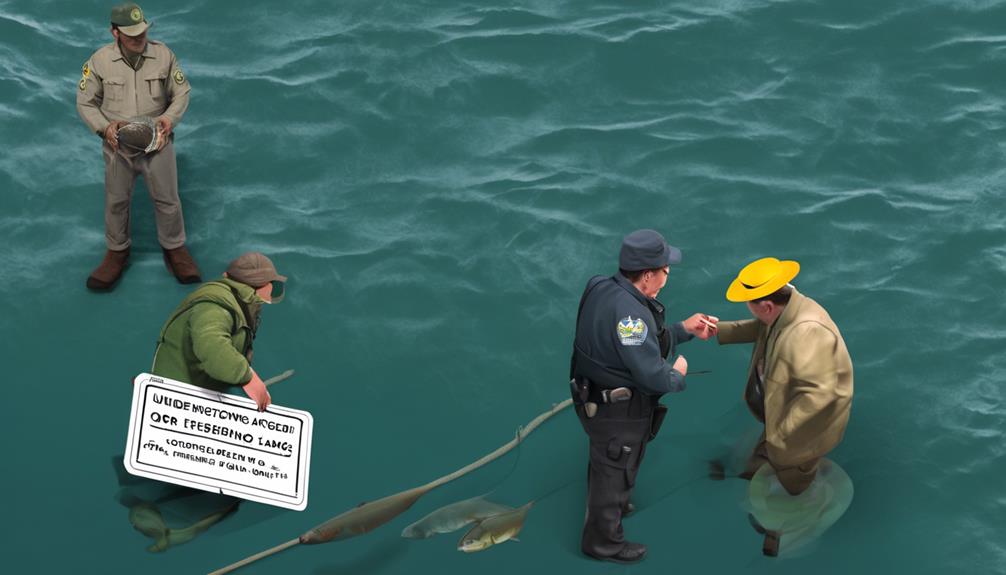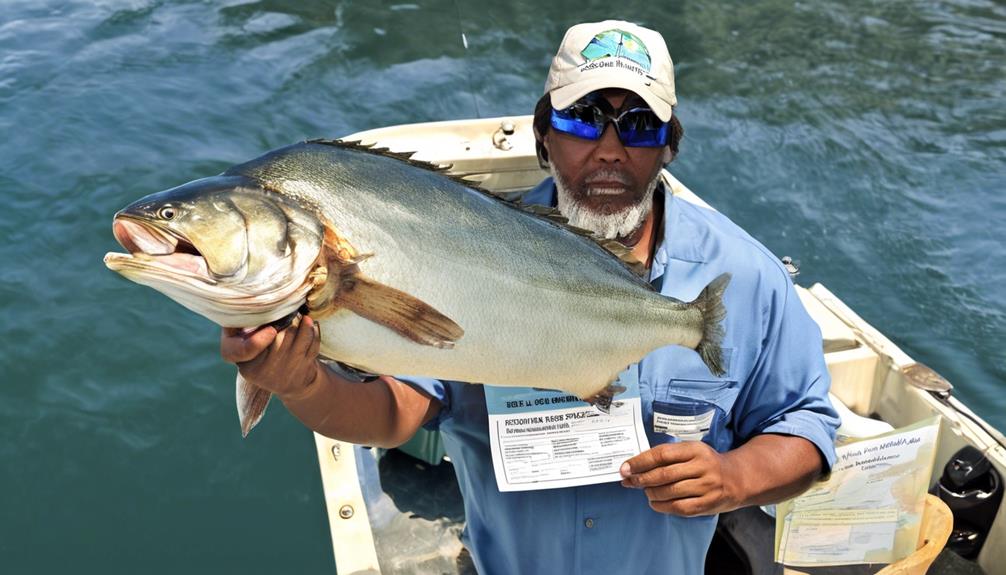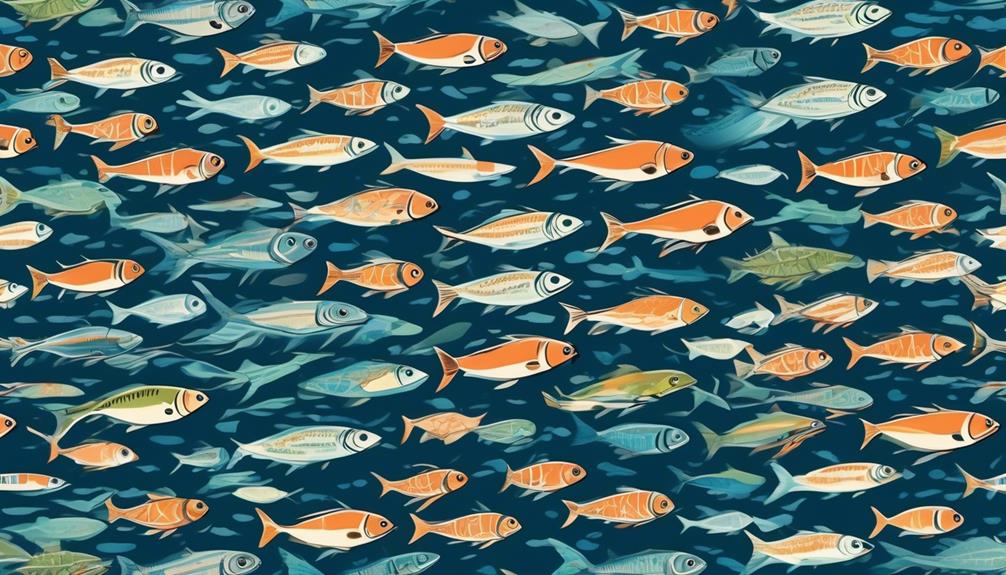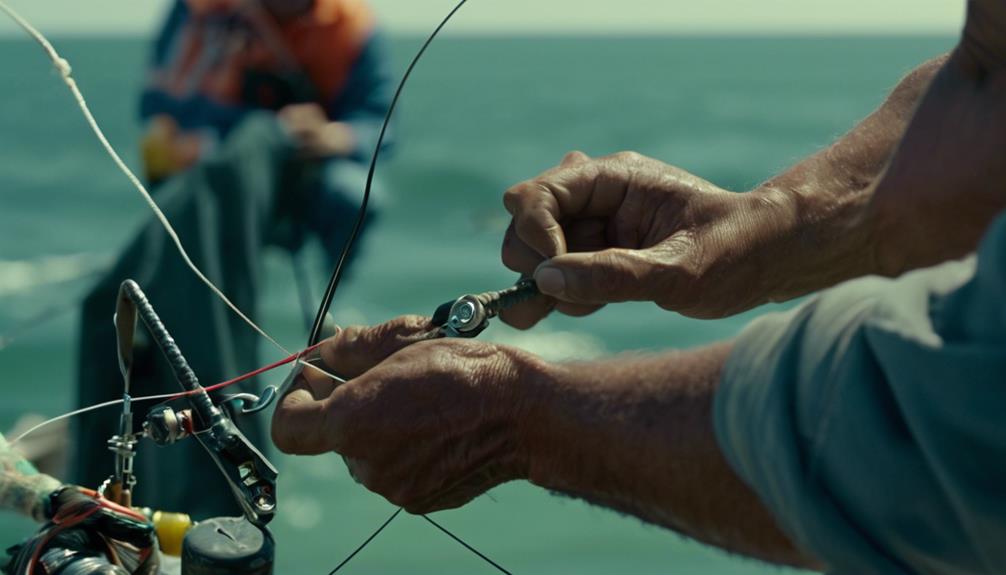You've probably heard the saying, 'There are plenty of fish in the sea,' but have you ever considered why saltwater fishing regulations and licenses matter?
It's not just a matter of following the rules; there's a lot more at stake when it comes to managing our oceanic resources. Understanding the significance of these regulations and licenses goes beyond mere compliance – it's about the sustainability of our marine ecosystems and the livelihoods of countless individuals.
So, why should you pay attention to these regulations and licenses? Let's take a closer look at the far-reaching impact they have on our environment, economy, and communities.
Importance of Fishing Regulations
Understanding the importance of fishing regulations is crucial for maintaining healthy fish populations and sustainable ecosystems. By adhering to these regulations, you directly contribute to the preservation of marine life and the balance of aquatic environments. The environmental impact of overfishing and irresponsible practices can be devastating, leading to the depletion of fish stocks and disruption of the natural food chain. Sustainable practices, such as following catch limits and size restrictions, are essential for ensuring that fish populations can replenish and thrive. By respecting these regulations, you actively participate in safeguarding the delicate balance of marine ecosystems.
Furthermore, fishing regulations play a vital role in protecting non-targeted species and habitats. By implementing measures such as restricted areas and gear limitations, these regulations help minimize unintended bycatch and damage to sensitive marine environments. Your adherence to these rules directly contributes to the conservation of various species and their habitats, promoting overall biodiversity and ecological stability in the oceans.
In addition to environmental considerations, fishing regulations also contribute to the sustainability of the fishing industry. By preventing overexploitation, these regulations help secure the long-term viability of fisheries, ensuring that both current and future generations can continue to enjoy the benefits of recreational and commercial fishing. Embracing sustainable practices today guarantees the availability of fish stocks for tomorrow, preserving a valuable food source and livelihood for countless individuals.
Types of Saltwater Fishing Licenses
When planning a saltwater fishing trip, it's essential to be aware of the various types of fishing licenses required for legal compliance. Different types of saltwater fishing licenses are available, each tailored to specific activities and permit requirements.
The most common types include recreational fishing licenses, commercial fishing licenses, and charter fishing licenses. Recreational fishing licenses are typically for individuals engaging in fishing for personal enjoyment, while commercial fishing licenses are designed for those who intend to sell their catch. Charter fishing licenses are necessary for captains and crew members of fishing charters, allowing them to take paying customers out on fishing trips.
It's important to note that each type of fishing license may have specific catch limits and permit requirements, which must be adhered to at all times. These catch limits are put in place to ensure the sustainability of fish populations and to prevent overfishing.
Additionally, different states and countries may have their own regulations and variations of these licenses, so it's crucial to familiarize yourself with the specific requirements of the location where you plan to fish.
Conservation Benefits of Fishing Regulations
Exploring the conservation benefits of fishing regulations reveals their crucial role in preserving marine ecosystems and sustaining fish populations for future generations.
Fishing regulations are designed to ensure the sustainability of fish populations, allowing them to thrive and reproduce without being overexploited. By managing the number and size of fish that can be caught, regulations help prevent overfishing and depletion of fish stocks. This proactive approach to conservation benefits not only the fish populations but also the overall health of marine ecosystems.
Conservation measures such as catch limits and size restrictions foster the recovery of fish populations, allowing them to maintain a healthy balance within their ecosystems. This, in turn, supports the biodiversity of marine habitats and contributes to the overall resilience of the ecosystem. Additionally, fishing regulations often target specific species that are at risk, providing them with the opportunity to rebound and contribute to the ecological stability of their environment.
Furthermore, effective management through fishing regulations can also lead to economic benefits. By preventing the collapse of fish stocks, regulations help sustain fishing industries and the livelihoods of those who depend on them. Moreover, thriving fish populations can attract recreational and commercial fishing activities, contributing to local economies and providing employment opportunities.
In essence, the conservation benefits of fishing regulations are multifaceted, encompassing ecological, economic, and societal advantages. Through responsible management, these regulations play a pivotal role in safeguarding marine resources for present and future generations.
Compliance With Saltwater Fishing Laws
Complying with saltwater fishing laws ensures the sustainability of fish populations and the overall health of marine ecosystems, benefiting both the environment and the fishing industry. However, enforcement challenges often arise due to the vastness of marine areas, making it difficult for authorities to monitor and regulate fishing activities effectively. This can lead to illegal, unreported, and unregulated (IUU) fishing, which undermines conservation efforts and jeopardizes the balance of marine ecosystems.
Ethical considerations also come into play when it comes to complying with saltwater fishing laws. Responsible anglers understand the importance of adhering to regulations to protect the long-term viability of fish stocks. By following size limits, bag limits, and seasonal restrictions, you contribute to the conservation of fish populations, ensuring that future generations can also enjoy the thrill of saltwater fishing. Additionally, compliant behavior sets a positive example for others, promoting a culture of ethical and sustainable fishing practices.
Despite the enforcement challenges and ethical considerations, it's crucial for all anglers to prioritize compliance with saltwater fishing laws. By doing so, you actively participate in the preservation of marine ecosystems and the sustainability of fish populations. This not only supports the health of the environment but also safeguards the future of the fishing industry, ensuring that it can continue to thrive for years to come.
Economic Impact of Fishing Regulations
To understand the economic impact of fishing regulations, it's essential to consider the various ways in which these regulations influence both the fishing industry and the broader economy. The economic impact of fishing regulations extends far beyond the immediate costs of compliance. It influences the industry's sustainability and the overall economic health of coastal communities.
Here are three key ways in which fishing regulations impact the economy:
- Economic Stability: Fishing regulations play a crucial role in ensuring the long-term sustainability of fish stocks. By preventing overfishing and protecting vulnerable species, these regulations contribute to the stability of fish populations. This, in turn, supports the economic stability of the fishing industry. Sustainable fishing practices help maintain a consistent supply of fish, which is essential for the financial well-being of fishermen and related businesses.
- Tourism and Recreation: Fishing regulations also impact the tourism and recreational fishing sectors. Regulations that preserve the health of marine ecosystems attract recreational anglers and tourists, contributing to local economies. Moreover, sustainable fishing practices help maintain the natural beauty and biodiversity of coastal areas, making them more attractive to visitors.
- Market Access and Trade: Fishing regulations can affect a country's access to international markets. By demonstrating a commitment to sustainable fishing practices through robust regulations, a country can enhance its reputation as a responsible steward of marine resources. This can open up opportunities for increased seafood exports, benefiting the national economy. Conversely, failure to adhere to sustainable fishing practices can lead to trade restrictions, impacting the income of the fishing industry.
Role of Enforcement in Fishing Regulations
Enforcing fishing regulations is essential for preserving marine ecosystems and ensuring the sustainability of fish populations. The effectiveness of enforcement plays a critical role in the overall impact of fishing regulations. When enforcement is strong and consistent, it acts as a deterrent to illegal and unsustainable fishing practices. This, in turn, helps in maintaining healthy fish stocks and preventing overfishing.
The effectiveness of enforcement can be measured by the level of compliance with fishing regulations. When regulations are actively enforced, fish populations have a better chance to thrive and reproduce, ultimately contributing to the overall health of marine ecosystems. Conversely, weak enforcement can lead to disregard for regulations, resulting in overfishing and ecological imbalance. Therefore, the impact of fishing regulations heavily depends on the extent to which these rules are enforced.
Regulatory impact is directly linked to the enforcement of fishing regulations. When enforcement is robust, it supports the objectives of the regulations, such as protecting endangered species, preserving habitats, and maintaining sustainable fish populations. However, when enforcement is lacking, the regulations become less effective, and the intended goals may not be achieved.
Therefore, to ensure the success of fishing regulations, it's crucial to invest in effective enforcement mechanisms and resources. Enforcement plays a pivotal role in upholding the integrity of fishing regulations and safeguarding the delicate balance of marine ecosystems.
Implications of Violating Fishing Laws

The effectiveness of enforcement in fishing regulations is crucial, and violating these laws can lead to serious legal and ecological implications. When it comes to saltwater fishing, it's important to understand the implications of violating fishing laws. Here are three key points to consider:
- Legal Consequences: Violating fishing laws can result in serious legal repercussions, including fines, confiscation of equipment, and even imprisonment in severe cases. These consequences are in place to deter individuals from engaging in activities that can harm the marine environment and its inhabitants. It's essential to familiarize yourself with the specific fishing regulations in your area to avoid facing these legal consequences.
- Environmental Impact: Ignoring fishing laws can have detrimental effects on the marine ecosystem. Overfishing, catching undersized or protected species, and using prohibited gear can disrupt the balance of marine life and lead to irreversible damage to the environment. Violating fishing laws contributes to the depletion of fish populations and can harm fragile marine habitats, impacting not only the fish but also other species that depend on these ecosystems for survival.
- Reputation and Conservation Efforts: Violating fishing laws can tarnish your reputation as an angler and conservationist. It undermines the efforts of responsible anglers and conservation organizations who work tirelessly to protect marine resources. By adhering to fishing regulations, you contribute to the sustainable management of fish stocks, help preserve the marine environment, and set a positive example for others in the fishing community.
Community Involvement in Fishing Regulations
How can local communities actively participate in shaping and enforcing fishing regulations to ensure sustainable and responsible fishing practices?
Community involvement is crucial in the development and implementation of fishing regulations to ensure the preservation of marine resources. One way for communities to engage in this process is through active participation in local fisheries management councils or committees. These platforms provide opportunities for community members to voice their concerns, share their knowledge of local fishing grounds, and contribute to the decision-making process regarding regulations. By actively engaging in these councils, local communities can ensure that their perspectives are considered and that regulations are reflective of their needs and concerns.
Another essential aspect of community involvement in fishing regulations is regulatory transparency. When regulations are being developed or modified, it's vital for the community to have access to information regarding the proposed changes. This allows for meaningful engagement and input from community members, ultimately leading to regulations that are well-informed and supported by the local population.
Additionally, community members can also play a role in enforcing fishing regulations by reporting any violations they observe. This active participation in monitoring and reporting violations contributes to the overall effectiveness of regulations and helps in the conservation of marine resources.
Frequently Asked Questions
What Are the Penalties for Fishing Without a Saltwater Fishing License?
Fishing without a saltwater fishing license can result in hefty penalties. Enforcement measures include fines, confiscation of equipment, and even potential legal action. It's important to ensure you have the proper license to avoid these consequences.
How Do Fishing Regulations and Licenses Impact the Health of Saltwater Fish Populations?
Fishing regulations and licenses directly impact the health of saltwater fish populations. They help conserve fish stocks, support economic activities, and enforce measures to ensure sustainable fishing practices. These efforts are crucial for the long-term health of marine ecosystems.
Can You Fish in Saltwater Without a License if You Are Only Catch and Release?
You can't fish in saltwater without a license, even if you're catch and release. Licenses fund conservation efforts and help monitor fish populations. By following regulations, you support sustainable fishing and protect the health of saltwater fish populations.
Are There Any Exemptions for Certain Groups, Such as Veterans or Senior Citizens, When It Comes to Saltwater Fishing Licenses?
Yes, there are exemptions for veterans and seniors when it comes to saltwater fishing licenses. These exemptions help ensure access for all, allowing individuals who have served or are older to enjoy fishing without the burden of additional fees.
How Do Fishing Regulations and Licenses Vary From State to State in the Us?
Fishing regulations and licenses vary from state to state in the US. Interstate differences exist due to unique conservation efforts and regional fish populations. It's important to understand and follow these regulations to support sustainable fishing practices.
Conclusion
So, now you understand why saltwater fishing regulations and licenses matter.
By following these regulations, you help conserve marine life, support local economies, and ensure the sustainability of fishing for future generations.
Your compliance with these laws not only benefits the environment but also contributes to the overall well-being of the fishing community.
Thank you for doing your part in preserving our marine resources.



